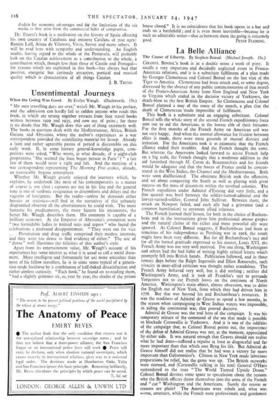Unsentimental Journeys
When the Going Was Good. By Evelyn Waugh. (Duckworth. 15s.) " MY own travelling days are over," writes Mr. Waugh in his preface, and the admission can hardly fail to sadden anyone who reads this book, in which are strung together extracts from four travel books written between 1929 and 1935, and now out of print ; for there is no doubt that Mr. Waugh does this sort of thing extremely well. The books in question dealt with the Mediterranean, Africa, British Guiana and Abyssinia, where the author's experiences as a war correspondent provided the scintillating material for Scoop. Already a faint and rather agreeable patina of period is discernible on this early work. If, in some literary general-knowledge paper, com- petitors were asked, " Who wrote, in what decade, of a night-club proprietress ' She seemed the least bogus person in Paris' ? " a fair few of them would score a right and left. And the mention of a war correspondent representing The Morning Post evokes, already, an irrevocably bygone atmosphere.
Whether Mr. Waugh greatly enjoyed the journeys which, he explains, he undertook like most of his contemporaries as a matter of course is not clear ; raptures are not in his line and the general tone is one of sardonic resignation to discomforts and delays and the vagaries of foreigners. But the reader—unless he demands either heroics or statistics—will find in the narratives of this urbanely disgruntled observer all the entertainment he could wish. The more fantastic his predicaments, the more bizarre his encounters, the better Mr. Waugh describes them. Hii comment iS capable of a brilliant economy. At the Emperor of Abyssinia's coronation were " two formidable ladies in knitted suits and topees " who found the celebrations a profound disappointment. " They were out for vice . . Prostitution and drug traffic comprised their modest interests, and they were too dense to find evidence of either." The use of " dense " well illustrates the felicities of this author's style.
Apart from its entertainment value, Mr. Waugh's account of his experiences has some interest as what it is usual to call a social docu- ment. More intelligent and (fortunately for us) more articulate than most of his fellow travellers, he is in some sense typical of a genera- tion made footloose by a combinaton of half-baked dissatisfaction and rather aimless curiosity. " Each book," he found on re-reading them, " had a slightly grimmer air, as, year by year, the shades of the prison house closed." It is no coincidence that his book opens in a bar and ends on a battlefield ; and it is even more inevitable—because he is such an admirable writer—that in between them the going is extremely


































 Previous page
Previous page